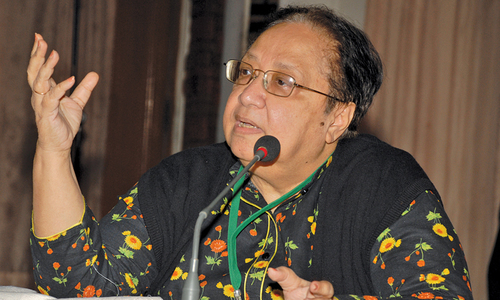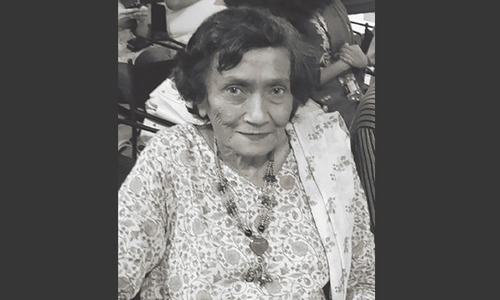The Accidental Journalist
Winner of the International Women Media Foundation’s (IWMF) 2012 Lifetime Achievement Award, veteran journalist Zubeida Mustafa is humble and down to earth. A 33-year tenure as Assistant Editor at DAWN, a book on Pakistan’s education sector and awards for contributions to journalism and promoting a stronger book and reading culture in Pakistan (a result of her work for DAWN’s in-paper magazine on Books & Authors) haven’t made Mrs Mustafa (as she is popularly known) supercilious or condescending in any way. As we sat down for a chat in front of the large balcony at her sea-facing apartment with the balmy sea breeze blowing in, her humour, candour and quiet confidence conveyed more passion and proficiency than mere words ever could.
Ironically, words and facts have governed her professional existence. In fact, if there’s one thing Mrs Mustafa becomes visibly impassioned about, it is people’s inability to provide accurate dates and facts in a piece of writing. For her, the effects of such lazy writing are long term.
“Fifteen years from now no one will know what is correct and this inaccurate information will become part of history.”
In a new and dynamic journalistic environment where anecdotal evidence and ‘informed sources’ are often quoted as facts, Mrs Mustafa’s approach may appear old fashioned but the reasoning behind it is solid. It comes from her years as a researcher at the Pakistan Institute of International Affairs (PIIA), her first job after completing a degree in International Relations from the University of Karachi.
Several life-changers took place during her seven years at the PIIA, the first of which was marriage. This was followed by a Commonwealth Scholarship to the London School of Economics for a PhD. She deferred the scholarship for a year to give birth to the first of her two daughters. When she eventually decided to go to London, she had to leave her daughter with her in-laws in what was then East Pakistan, a separation that she did not bear well.
“I simply didn’t anticipate how I would feel, but after six months in London I couldn’t concentrate on anything; I just wanted to be with my baby. In addition, East Pakistan was becoming an increasingly insecure place so I decided to return and we moved to Karachi.”
“Fifteen years from now no one will know what is correct and this inaccurate information will become part of history.”
The move to Karachi brought with it another baby and plenty of freelance writing for PIIA publications as well as Iqbal Burney’s Outlook, a weekly current affairs magazine. When Mrs Mustafa finally decided to resume professional life in 1975, she joined DAWN as an Assistant Editor, a move she describes as an “accident”.
An accident that turned into a rewarding career. In the pre-internet age of the mid-70s, Mrs Mustafa edited the DAWN Overseas Weekly that gave overseas Pakistanis an overview of what was happening in Pakistan, in addition to being a leader writer for DAWN.
Newspaper jobs were not easy to come by in the 70s because the press was tightly controlled by the government and no new newspaper or magazine could be established without governmental consent.
“When people got into a newspaper they just stayed there for the rest of their lives. Because most of the jobs went to men, it was something of a big deal for a woman to get into a newspaper, and especially in the editorial section.”
Although Mrs Mustafa continued to be a leader writer for the rest of her career, when the government eventually loosened its control on the press and new English language newspapers were established, she was made responsible for a slew of in-paper magazines which were specifically created to give DAWN a leg-up over the competition.
“I would work on a new in-paper magazine for a year along with an assistant, then hand it over to someone else and work on establishing a new one. In this way, I worked on DAWN’s health page, book page (now Books & Authors), careers page and others and also trained younger journalists.”
Mrs Mustafa did more than just train journalists and launch new pages at DAWN. She also wrote about issues in education and the social sector, and most importantly, she managed to take women’s issues from their designated small space in one section of the newspaper and embed them within all sections of the newspaper.
She eventually decided to quit her job at DAWN in 2008 and focus her energies on writing a book about education but “although there were plenty of books on education and I wanted to tackle something new,” which led her to choose the issue of language in Pakistani education.
In The tyranny of language in education: the problem and its solution, published by Ushba Books in May 2011, Mrs Mustafa sets forth the idea that to affect true educational reform in Pakistan, children need to be taught in their mother tongue at least during their formative years. The view is extremely controversial for a society where proficiency in English is highly valued and sought after at almost every level of academic and professional life. Mrs Mustafa, however, remains steadfast in her opinion.
“We are forcing people who come from a non-English speaking background to study in a language they don’t understand.”
From these views, many people have inferred that Mrs Mustafa is against English as a medium of study. This, she says, is absolutely untrue. “I am not against English, I am merely saying that let’s use Urdu at the primary level so that everyone can get the basics right and then people can switch to whichever language they prefer.”
That being said, Mrs Mustafa has no illusions of this being a simple issue; she is cognisant of the fact that plenty of advocacy is required to change mindsets and of the economic implications of studying in Urdu in a market where most good employers require applicants to well versed in English.
At the end of the day, however, the book has made waves and Mrs Mustafa is working on a second edition with improvements, revisions and on-ground research from schools. In addition to this, she is compiling a book on the history of the Sindh Institute of Urology and Transplantation (SIUT). She also remains an active member of the Women’s Action Forum (WAF).
In spite of these engagements, at 70, Mrs Mustafa has slowed down the pace of work “choosing only the projects I want to do and politely declining the ones I don’t find interesting”. This, she tells me, is something she was unable to do while working full time at DAWN.
“If the editor asked you to write about something, you didn’t argue, you just wrote it. That is the way it should be. Every organisation needs discipline; you simply cannot function without it.”
In that statement lies Mrs Mustafa secret formula. It’s that kind of commitment to her profession that made this accidental journalist a not-so-accidental success.




Comments (0) Closed